On Monday, I was in USA Today talking about the National Association of Realtors settlement and the future of U.S. housing prices. For those unwilling to click, here’s the even-shorter version: Yes, the settlement might lower realtor commissions and thus shave a few thousand bucks off a home’s all-in sales price, but Americans shouldn’t expect a reprieve from ever-increasing housing prices without far more fundamental reforms to occupational licensing, zoning and land use regulation, construction materials tariffs, and other policies that increase building costs and restrict housing supply. For frequent Capitolism readers, much of the op-ed’s thesis and evidence will sound familiar, and I normally don’t pimp my non-Dispatch work up front here (seems gauche). But I mention it because there’s a line in the op-ed—bolded below—that I’ve been meaning to expand upon here:
Research has repeatedly shown that the most effective check on skyrocketing home prices is simply to build more homes. One survey of the literature found that new construction of market-rate units in several U.S. cities moderated the prices of all types of nearby housing, both high- and low-priced.
Recent experience shows much the same: places that have seen housing construction at rates above national or regional averages—Austin, Phoenix, Atlanta, Raleigh, Minneapolis and more—have enjoyed slower rent and home price appreciation.
This passage gets to the perhaps the biggest debate between “Yes In My Backyard” (YIMBY) advocates who want to deregulate housing markets and boost private housing development and those who have (presumably) good intentions but are far more skeptical of, or outright hostile to, such construction: whether building lots of new, market-rate housing helps Americans who can’t afford it.
The last couple years have provided a definitive answer: Yes.
A YIMBY (and ‘Filtering’) Victory Lap
We’ve already reviewed some evidence of this effect in Minneapolis, which experienced more market-rate construction and an across-the-board moderation in local housing costs after the city partially liberalized its zoning regulations. Since then, economists at the Minneapolis Federal Reserve dug deeper into the city’s recent experience to explain how this effect works—a process called “filtering”:
Imagine that a renter named Jim moves into a brand-new market-rate apartment. A renter named Maria moves into Jim’s old unit, which is more affordable than Jim’s new place. Another renter is going to move into Maria’s old unit. The chain will likely continue to include several more units, each progressively older and more affordable. It will end when someone moves out on their own from a previously shared living space.
This process of new construction encouraging mobility across the income spectrum is one piece of a phenomenon known as filtering. Theories connecting filtering to housing affordability are generally accepted among economists. For example, economic theory predicts that housing units should be relatively more affordable when the housing supply increases, as it does when new apartments open.
They go on to summarize important new research on filtering from Notre Dame economist Evan Mast, who examined housing construction in 12 metropolitan areas, including the Twin Cities, and found quick and significant price effects: Every 100 new market-rate apartments ultimately generated “about 70 new openings for renters in lower-income neighborhoods” after just five years. The Minneapolis Fed team then talked to local landlords, who confirmed similar effects on the ground (emphasis mine):
Owners and managers of older properties are well aware that new supply entering a market creates new opportunities for their renters to move up. Staff at the Federal Reserve Bank of Minneapolis recently wrapped up a research project that involved interviews with 16 large-apartment owners and property managers in the Minneapolis-St. Paul metropolitan area. Regardless of whether they owned newer or older properties, these owners and managers often cited the increased housing supply in the region as a reason why rents at their properties generally had not increased very much in the past few years.
As noted, this phenomenon is a core part of the YIMBY argument: Building homes, even “luxury” ones, will benefit all homebuyers and renters, not just the rich ones (and certainly not just “greedy developers”). And the real-world evidence supporting such filtering is piling up.
In Austin, for example, the Wall Street Journal reports that home prices and apartment rents “have fallen more than anywhere else in the country,” following a period of substantial housing construction. (Let’s ignore for now that the author bizarrely calls this “overbuilding,” even though he later acknowledges that “Austin home prices still run 35% higher than what the city’s underlying economic trends would typically support.”) Here are the telling charts:
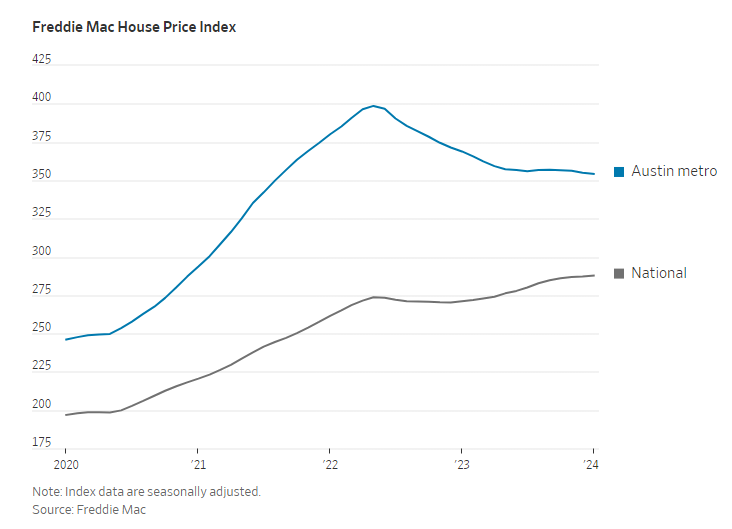
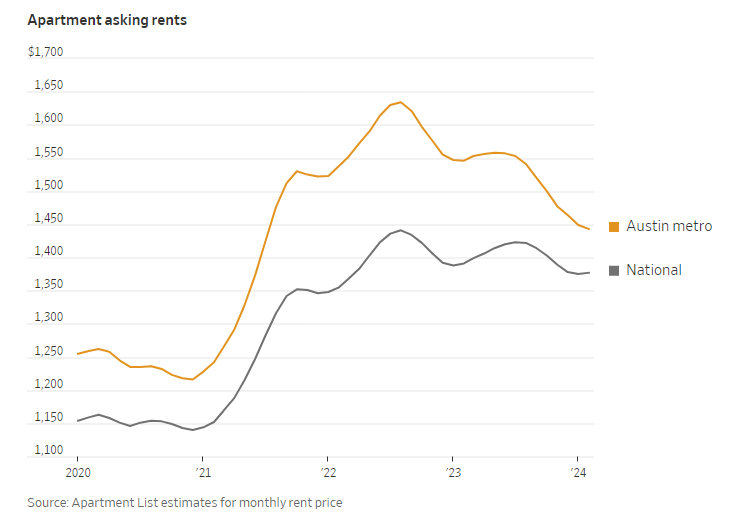
The Journal goes on to explain that the driving forces behind these price effects are good ol’ supply and demand. On the latter, the city is still growing above the national average but more slowly than in recent boom years. Yet it’s really the supply side where Austin stands out. Developers there “have been building more apartments than in any other city, measured as a share of the existing housing supply,” and not just a little more but a lot more—triple the national average, nine times that of San Francisco and Baltimore, and even greater multiples for other major U.S. cities:
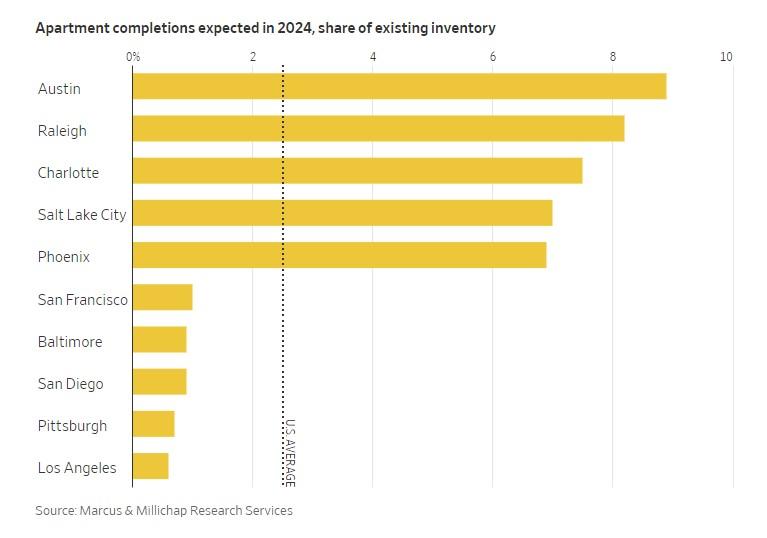
The key to all this development, in turn, is the city’s willingness to allow it. Economist Joey Politano, for example, recently showed that the Austin metro area (population: 2.4 million) permitted more housing units last year—especially large (five or more units) apartment buildings—than the Los Angeles (population: 12.8 million) and San Francisco (population 4.6 million) metros combined:

Housing economist Jay Parsons has even more data showing similar filtering effects—and faster than the five years indicated in Mast’s research. First, Parsons found last October that “high-supply” American cities—i.e., one with at least a 5 percent increase in housing inventory in 2022-23 —experienced declining rents while low-supply cities saw increases, and that rents declined most not in the newest, high-end “Class A” apartments but in middle-tier “Class B” apartments that are mainly older. Even the most affordable (and typically oldest) “Class C” saw bigger declines than the “luxury” Class A units getting built:
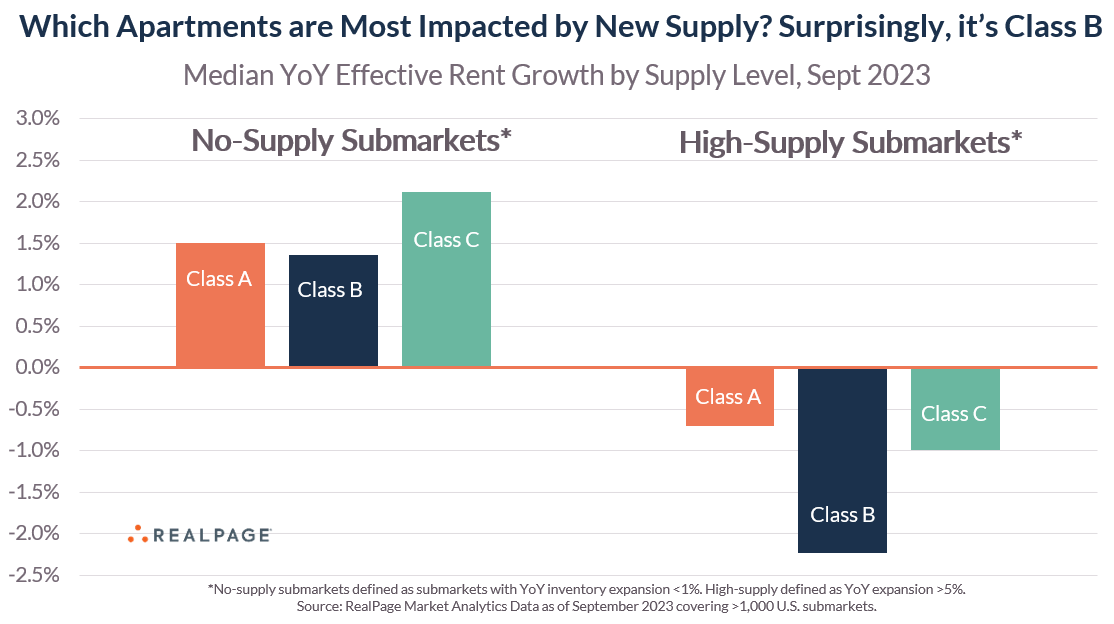
Parsons provided additional evidence in February, examining the 12 U.S. markets where Class C rents had fallen at least 6 percent over the last year and—to no YIMBY’s surprise—finding that new construction is their common link: “All 12 have supply expansion rates above the U.S. average.”

Other cities, such as Oakland and Dallas, are seeing similar trends. After following Austin’s (and Raleigh’s) lead, Charlotte may be next:
As I said in USA Today, this new evidence is consistent with piles of past research showing much the same thing: Permitting and building more market-rate housing—even “luxury” homes and apartments—puts downward pressure on the price of all types of housing, benefiting all consumers in the long run. It’s also consistent with research from markets outside the United States, such as Tokyo or New Zealand, which recently liberalized its zoning regulations and has enjoyed both a construction boom and moderating housing costs:

Just for good measure, here’s filtering in Sweden and Finland, too:
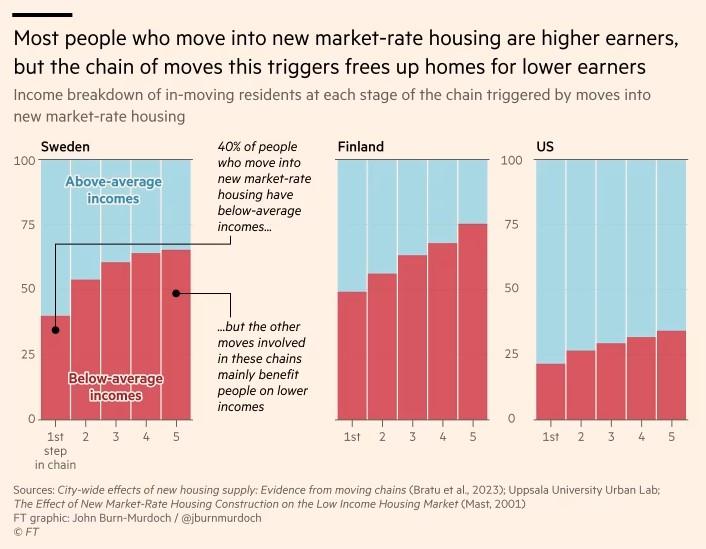
Thus, as Parsons concluded last October, the lesson for policymakers here is clear: “if you truly care about housing affordability and access, it starts by legalizing and approving a lot more housing.” Fortunately, as the New York Times’ Binyamin Applebaum just explained, many places are taking note:
While the specifics vary, the common theme is allowing the construction of a little more housing in areas previously reserved for single-family homes. California passed a law in 2021 allowing the construction of up to four units on single-family lots, although local governments have found other ways to stymie development. California has been more successful in allowing homeowners to add an apartment to any residential property. More than 80,000 of these “accessory dwelling units” have been permitted since 2016.
The cities of Minneapolis and Charlotte, and the states of Washington, Montana and Maine are among those that eliminated most single-family zoning in recent years. Communities across the country have made it easier to build accessory dwelling units.
These and other places give homebuyers, renters, and pro-building YIMBYs reason to celebrate.
But the Housing War Still Rages
That said, the war for American housing abundance is not yet won. Most obviously, not every U.S. city is building like the places above are—and not just notoriously difficult markets like San Francisco and Los Angeles. Applebaum notes, for example, that the New York region has been particularly slow to embrace reform and get to building, even though Gov. Kathy Hochul has prioritized the effort. Per the following Politano chart, many places in the United States also remain supply-constrained:
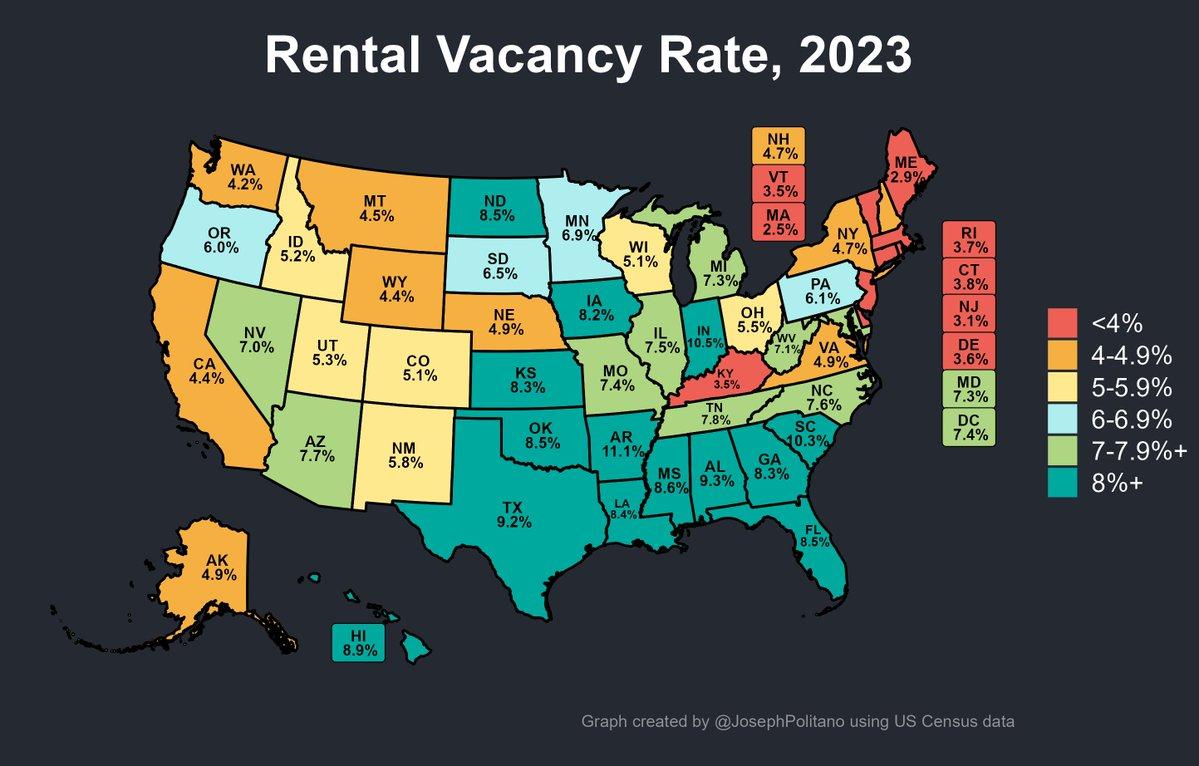
Similarly, construction of new homes in the United States has improved but remains well below pre-Great Recession levels:
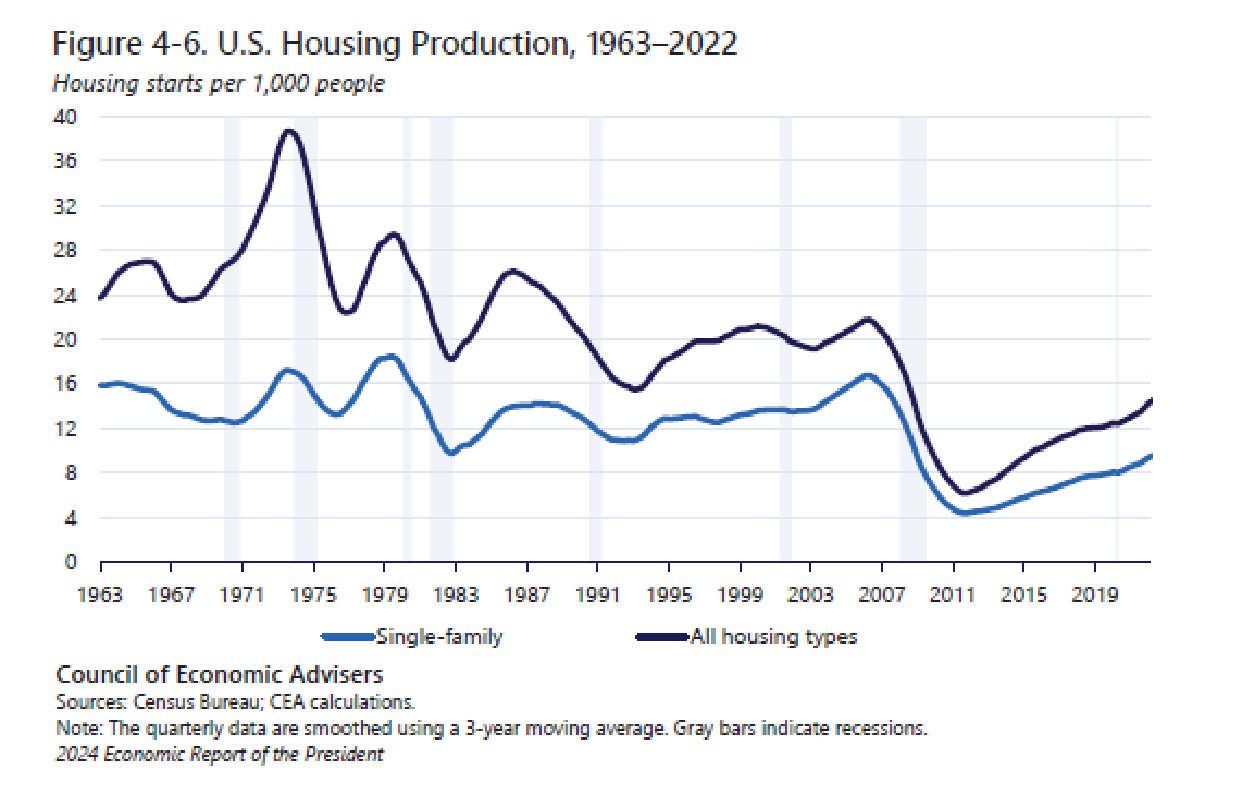
No surprise, then, that rents and home prices in many places are still high and rising. Parsons shows, for example, that many markets in the Midwest and Northeast continue to build slowly and are seeing higher rents as a result. In fact, even as rents moderated nationwide last year, 18 of the nation’s 150 largest metro areas still saw Class C (lowest-price) rent growth top 5 percent last year, and almost all of those places had little new apartment supply. As Harvard researcher Whitney Airgood-Obryck recently noted, while there’s good evidence of filtering in high-supply areas, rents still rose in 91 of 150 markets at an average rate of 3 percent or more. That’s better than last year, sure, but it’s still growing—and from a very high level.
According to Rent.com, in fact, rents last month were still 21 percent higher than they were pre-pandemic, while median home prices are almost 27 percent higher. Overall, most housing experts see housing prices remaining high because of a continued supply shortage—somewhere between 2 million and 7 million homes, depending on whom you ask. So, YIMBYs have won some big and important battles but still have a long way to go.
Anti-construction NIMBYism (“Not In My Back Yard”), meanwhile, remains a force in local politics. As I noted in 2022, for example, Raleigh’s pro-building city council was transformed that year, following a concerted effort by the ‘Save Our Neighborhoods’ and like‐minded groups who sought to oust local officials for their votes on local zoning deregulation and various construction projects. Since then, the city has rejected several big development proposals near the city center, and the NIMBYs are gunning for more. Other cities and states are seeing similar responses to pro-building efforts—vetoing deregulation proposals or even rolling back past reforms (e.g., in Minneapolis).
NIMBYs have inherent political advantages common to most forms of protectionism: A small number of current (and vocal) residents enjoy concentrated benefits, at least in the short-term, while a bigger number of silent outsiders pay diffuse, mostly unseen costs. Just as importantly, the former group gets to vote, while the latter mostly doesn’t.
As The Atlantic’s Derek Thompson writes, however, NIMBYism also benefits from factors unique to the U.S. housing market. For starters, most Americans think weird and conflicting things about housing. We want it to be a steadily appreciating investment (and thus might oppose efforts to lower prices), but we also want it to be affordable. And, likely because we only see expensive new construction and miss the unseen filtering, many Americans hold unique views about housing supply and demand:
In 2022, three economists asked several thousand Americans a few simple questions about how supply and demand works in various markets. For example, if automakers suddenly stopped making new cars and trucks, what happens to the price of used vehicles? Or, if a farm started using an amazing new fertilizer and got a huge boost in grain yield, what will happen to the price of the grain? Contrary to the assumption that Americans don’t understand basic economics, the survey respondents did pretty well on the test. They correctly guessed that a shortage of cars would shift car prices up and that a surge in grain production would shift grain prices down. So far, so good.
Then the economists asked the participants about housing. They said: If a new law makes it easier to build dwellings near train stops, what happens to housing prices? Well, all of a sudden, the laws of supply and demand no longer applied. More than a third of participants said that “a large, exogenous increase in their region’s housing stock” would cause rents and home prices to rise. “The public understands the implications of supply and demand in markets for agricultural commodities, for labor, and even for cars, a durable consumer good that, like housing, trades in new and second-hand markets,” the authors wrote. Only when the subject is housing do many Americans despair that you can never build your way out of a shortage.
Finally, policies ostensibly intended to increase local construction can get crippled by advocates who attach certain “strings”—parking, bus stops, green space, etc.—before letting people develop or expand the properties they own. In Seattle, for example, the city relaxed zoning regulations in certain neighborhoods but “required developers to either reserve some units of each project as below market rate rentals or pay into a citywide affordable housing fund.” As a result, developers appear to have strategically sited projects away from newly upzoned plots “and instead to nearby blocks and parcels not subject to the program’s affordability requirements.” The affordability requirements thus “act as a tax on some additional development”—consistent with previous research. Thus, “on balance, the cost of the affordability requirement to developers outweighed the benefit of additional units via upzoning, especially in areas zoned for low-rise development.” Such strings certainly aren’t unique to Seattle and instead appear frequently when developers ask a city for an exception (variance) from certain zoning restrictions, such as building height. And the result is often fewer units built or, even worse, none at all.
Back here in North Carolina, for example, local governments—seemingly oblivious to filtering—have blocked development plans because they lacked “affordable housing” set-asides. Onerous conditions attached to housing subsidies are another example of how (presumably) good intentions can—via higher costs, bureaucratic delays, and other problems—confound private efforts to resolve real housing problems via relatively simple market solutions.
Summing It All Up
While it may seem obvious (especially to savvy Capitolism readers), the idea that adding market-rate housing eventually lowers home prices and rents for everyone has been hotly debated for years. While filtering skepticism never made much theoretical sense, we now have ample scholarly work and real-world experience showing that, yes, supply and demand work for housing too, and therefore that, no, we don’t need elaborate, Rube Goldbergian government schemes to lower prices and rents for all Americans. Just build (and let people build), and it’ll work out—and quickly. Given the filtering findings and how they support pro-building policy reforms, which do have some momentum today, YIMBYs have reason to celebrate (if not gloat).
Nevertheless, there are still many parts of the country that suffer from limited construction and recalcitrant policymakers, and U.S. home prices and rents are still historically high (if not rising). So, while YIMBYs may have won the filtering battle, the national war on housing abundance still has yet to be won.
Chart(s) of the Week
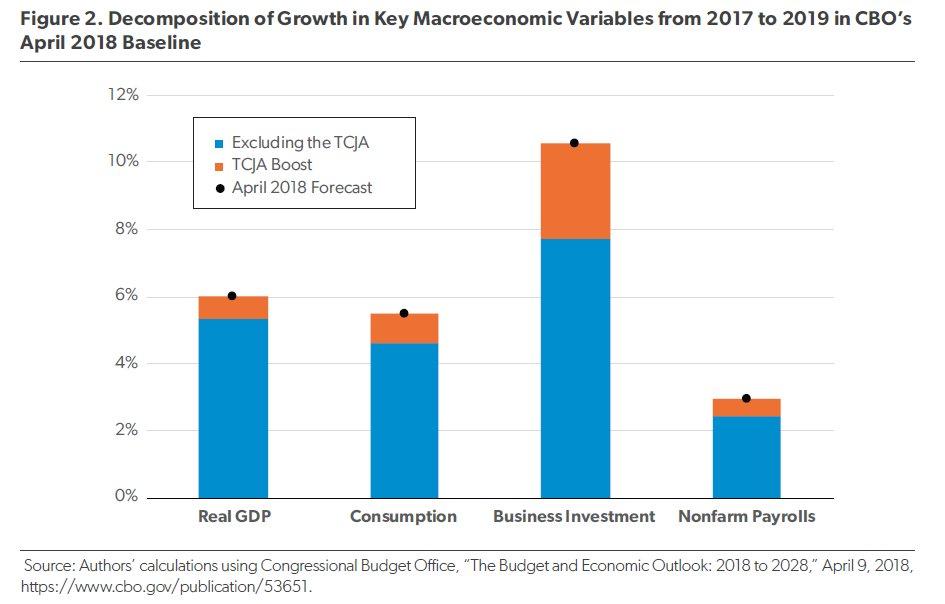
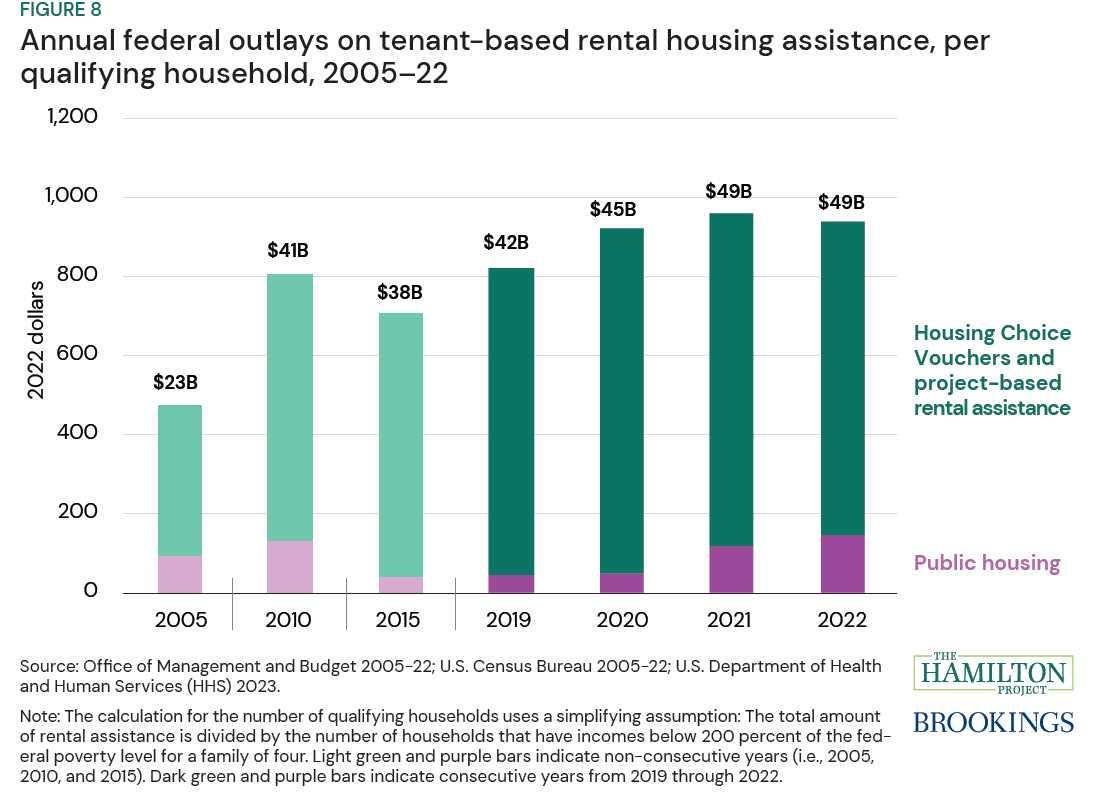
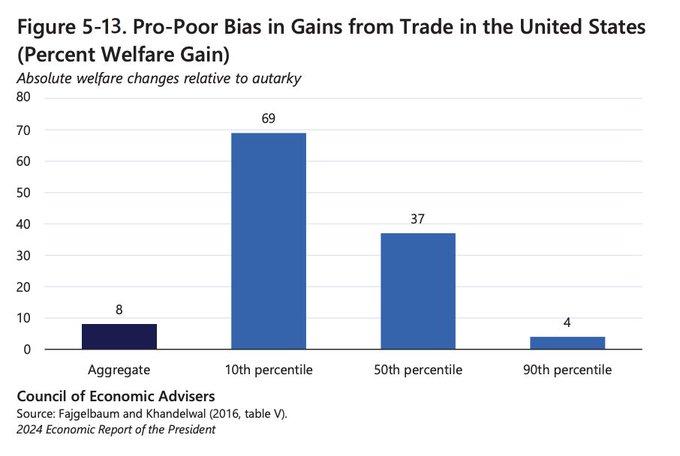
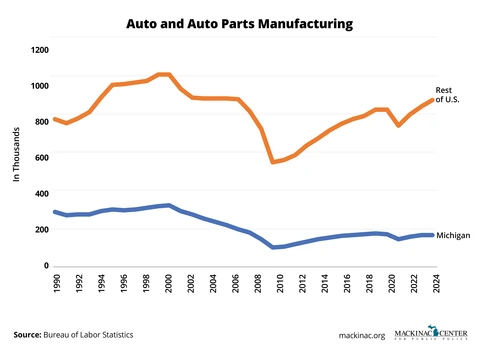
The Links
Two quick blog posts from me on White House economists’ solid trade econ and on the FTC’s pretty good report on the baby formula crisis
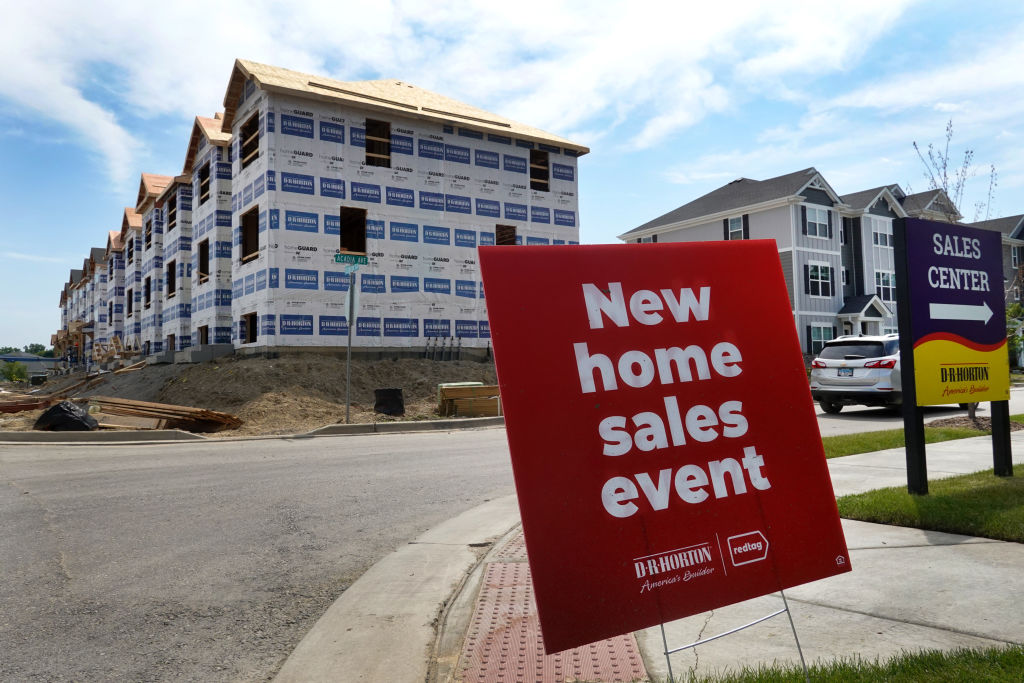






Please note that we at The Dispatch hold ourselves, our work, and our commenters to a higher standard than other places on the internet. We welcome comments that foster genuine debate or discussion—including comments critical of us or our work—but responses that include ad hominem attacks on fellow Dispatch members or are intended to stoke fear and anger may be moderated.
With your membership, you only have the ability to comment on The Morning Dispatch articles. Consider upgrading to join the conversation everywhere.